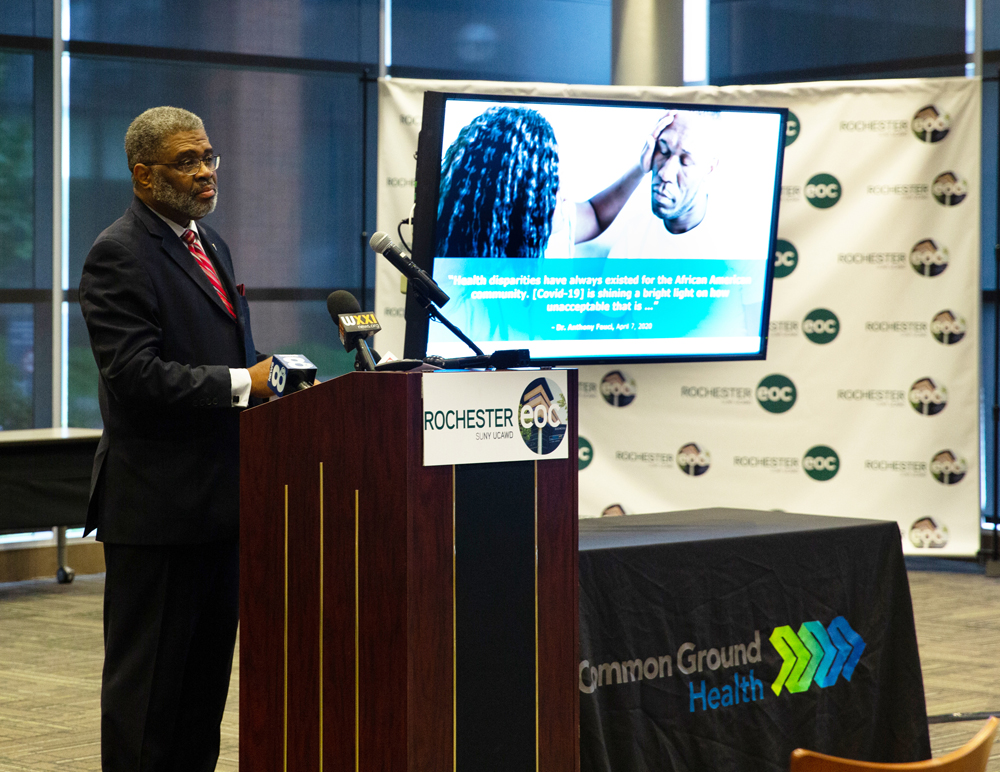Regional study finds racism is key drivers illness and early death for Black residents

Racial bias in housing, education, employment, criminal justice and other domains condemn Black people in Rochester and the Finger Lakes to sicker and shorter lives, according to an extensive new report by Common Ground Health.
“Structural racism is literally stealing the breath from the Black Community,” said Wade Norwood, CEO of Common Ground, the region’s health research and planning organization. “It is behind the deplorably higher rates of COVID infections and mortality for Black people; behind higher rates of heart disease, diabetes and asthma; behind more Black mothers dying in childbirth and more Black men dying of violence, sometimes at the hands of those charged with protecting their lives.
“To improve health for Black residents, we need to address what happens in the classroom, on the way to school, on the job and in the home. Health equity strategy must focus beyond the four walls of the medical clinic,” Norwood said
The Color of Health: The Devastating Toll of Racism on Black Lives does just that. The report connects the dots between the 67 percent higher premature mortality rate for African Americans in Rochester and the Finger Lakes and the upstream social constraints Black residents are forced to navigate.
Marrying health data with insights from experts and lived experiences, the report documents how racism, whether deliberate or unintentional, undermines physical and mental wellbeing. It shows how biased practices limit access to well-paying jobs, safe neighborhoods, nutritious food and health care; how segregated neighborhoods and schools limit opportunities that are foundational to a child’s future wealth and health; and how chronic exposure to racism has a weathering effect on the mind and body.
The researchers found that relative to White residents, African Americans in Rochester and the Finger Lakes are 50 percent more likely to experience life-threatening complications related to childbirth, three times as likely to have an infant die in their first year of life, six times as likely to wind up in the emergency room due to asthma, six times as likely to be admitted to the hospital for hypertension, and 57 percent more likely to report poor or fair mental health.
COVID-19 was no exception. Through the first eight months of the pandemic, Black residents of Monroe County were 2.9 times as likely to test positive for coronavirus and 2.6 times as likely to die from the disease.
Racial bias across nearly every social determinant of health means “Black Americans were forced to the front lines of a global pandemic with fewer resources to protect themselves, including being less likely to have sick leave, health care and jobs that allowed them to work from home,” the report noted.
To improve health for Black residents, the study calls for a deeper commitment to policies and programs that eliminate racial disparities, including:
•pushing for racial equity to be a strategic priority for boards of directors and organizational leaders,
•supporting existing anti-racist community initiatives such as the Commission on Racial and Structural Equity (RASE).
•investing in pipeline programs to increase the number of Black doctors and other health care professionals,
•developing health interventions through a racial-equity lens, and more.
Melissa Gardner, executive vice president, population health engagement at Excellus BlueCross BlueShield and Common Ground board member said: “Where people are born, live, learn, work, and play all contribute to a person’s health. These conditions, known as social determinants of health, especially when paired with the impacts of structural racism, affect a wide range of health, functioning and quality of life outcomes and risks. Access to high quality health care is a key step in driving the equity and opportunity all deserve.”
“Racism is a public health crisis,” said Common Ground Chief Medical Officer Dr. Linda Clark. “This report highlights in explicit detail the hazards of being Black. Racism is embedded in our social, economic and political systems, and it – not race – is the problem.”
The Color of Health is the second in a series of health equity studies produced by Common Ground since 2019. The African American Health Coalition guided the focus and recommendations in the report. Convened by Common Ground, the long-standing advisory and advocacy group brings together community leaders and health professionals to coordinate efforts to improve health for communities of color.
To view and download the report, go to www.commongroundhealth.org/ColorofHealth.
Provided information

